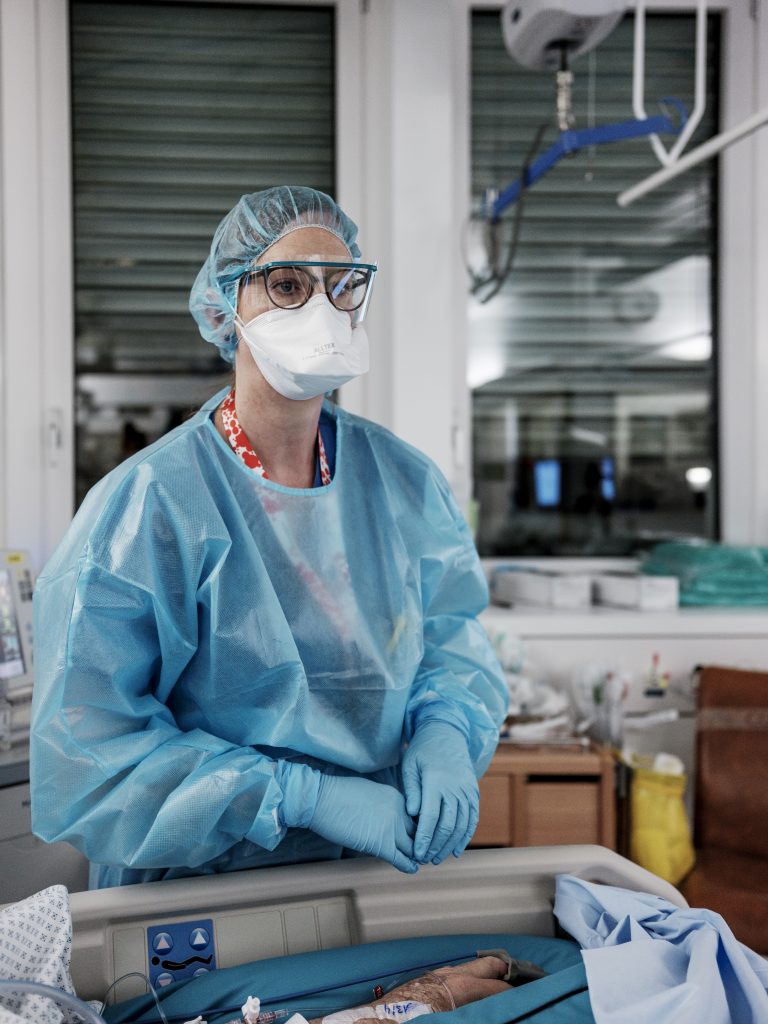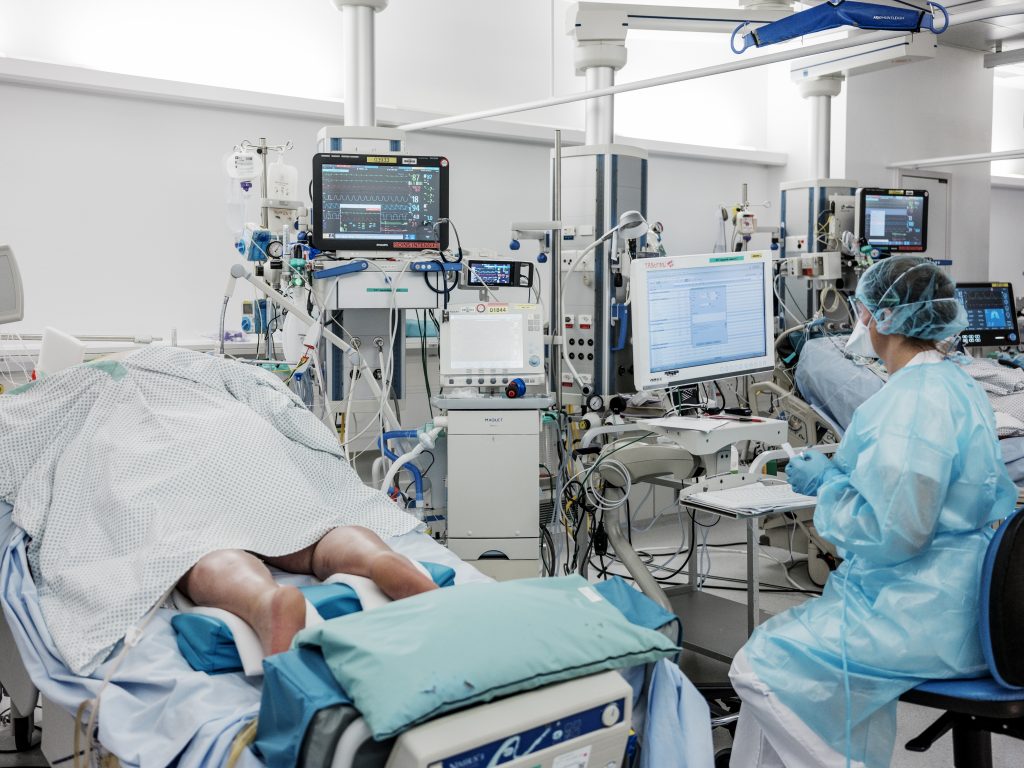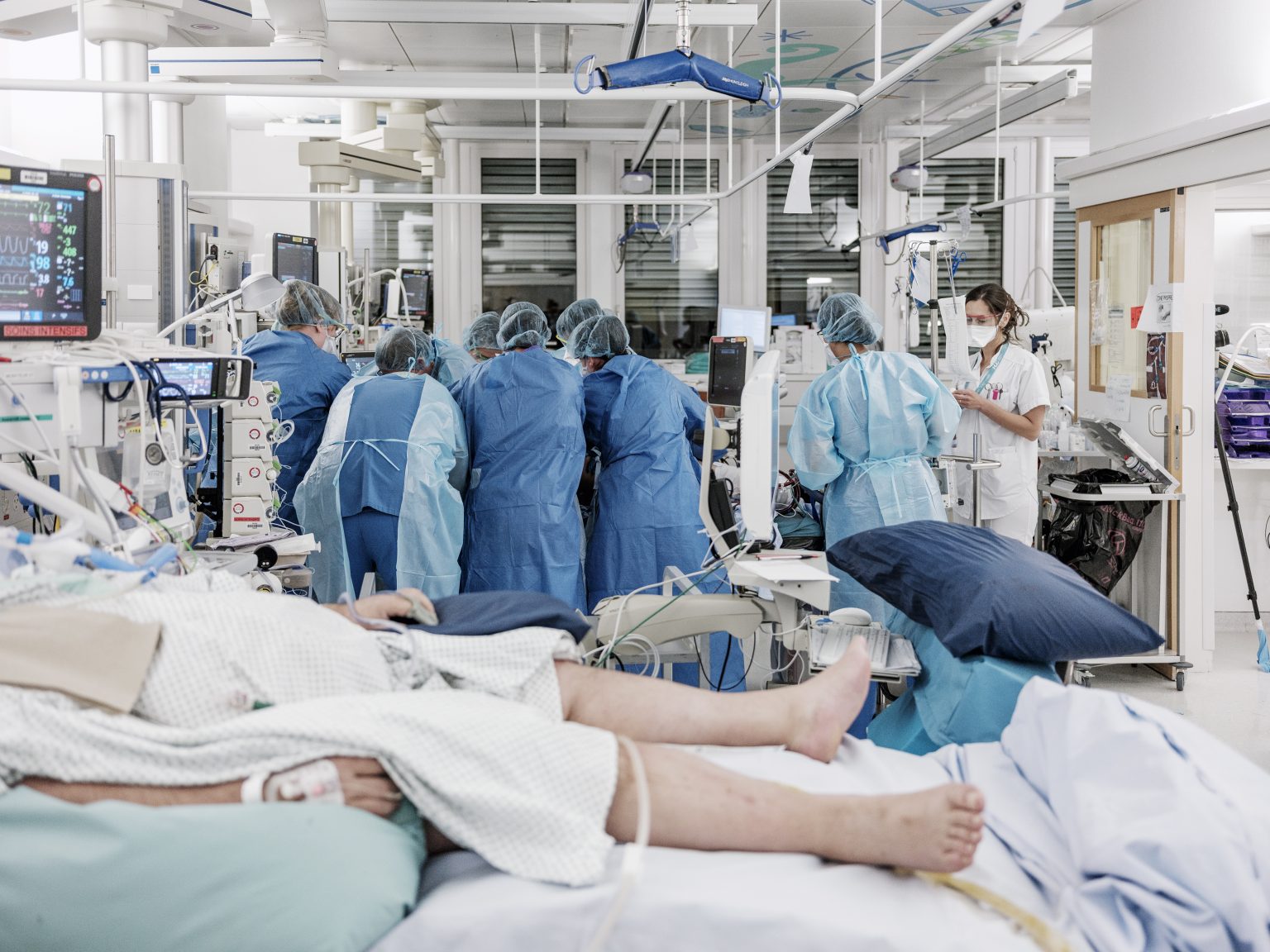Kathrine Zimmerman is a nurse who has worked in intensive care units at the Hôpitaux Universitaires de Genève (HUG), the university teaching hospital in Geneva, Switzerland. For 10 years, she completed humanitarian missions in Africa, Central America and Switzerland.
She currently manages the improvement of healthcare programme at Doctors Without Borders/Médecins Sans Frontières’ (MSF) headquarters in Geneva. She was seconded to work in the HUG’s intensive care unit for patients with COVID-19 during March 2020, and shares with us her daily life during this unexpected emergency.
When I arrive for my shift in the evening, I discover the unit to which I will be assigned for the next 12 hours. At first, the crossover between those starting and ending their shift was impressive, as there are so many of us! At the entrance of the changing rooms, it’s time to choose and put on my uniform for the night.
The size can vary but not the colours: blue and white! As soon as we enter the areas where patients are intubated, we put on FFP2, or ‘duck bill’, masks. In the corridors, as a precaution, we still wear conventional masks to protect each other. After two and a half weeks on duty in the COVID-19 unit, I spent one night in an intensive care unit for non-COVID patients, dressed normally with a normal surgical mask. It was very strange to be without all that clothing, I felt almost naked!
KATHRINE ZIMMERMAN, MSF GENEVA HQ STAFF, SECONDED TO HUG
“Although I did not necessarily imagine I would ever be responding to a pandemic of such magnitude in Europe, I am happy to be able to contribute, at my level, to this incredible mobilization.”

My small contribution
When the pandemic was declared and cases were admitted to hospital in Switzerland, I could hardly see myself working from home, especially when I had the opportunity to help reinforce the hospital teams. Although I did not necessarily imagine I would ever be responding to a pandemic of such magnitude in Europe, I am happy to be able to contribute, at my level, to this incredible mobilization.
At the HUG, intensive care has been extended over several buildings. Operating rooms, recovery rooms, intermediate care rooms and other services have been reassigned to receive patients with coronavirus COVID-19.
For the first two weeks, I cared for several ‘young’ patients under the age of 55, many of whom were able to be extubated and moved up to the continuing care floor. Some were discharged a few days later. This positive news is what keeps us going.
All the same, seeing so many people intubated, often lying on their stomachs to improve their breathing, is overwhelming. You don’t usually see that many intubated patients in the ICU. Here, they all are, and when I arrived, we were told that depending on the evolution of the crisis, we could potentially have five intubated patients per nurse.
I ended up with three of them on my first day and I must say it was very stressful to find myself in an unknown ward after several years outside of intensive care. Luckily, it didn’t come to that point and the situation is actually improving.
One thing that particularly strikes me about this extraordinary experience is the loneliness of the patients. The healthcare staff, nurses, doctors, are the only link between patients and their families.
A few days ago, one of the patients I was caring for was also celebrating his birthday (we share the same birthday). I was able to celebrate with my family, even if it was via Skype. He spent his 80th birthday alone. And his family too. That’s tough. I’ve since learned that he was extubated. I hope he’ll be reunited with his family soon!

KATHRINE ZIMMERMAN, MSF GENEVA HQ STAFF, SECONDED TO HUG
“One thing that particularly strikes me about this extraordinary experience is the loneliness of the patients. The healthcare staff, nurses, doctors, are the only link between patients and their families.”
Worlds apart, but similarities between the field and my experience at HUG
There are similarities with my experience as a humanitarian, mainly in the fear of the disease. I see parallels with my years of experience in the field with how worried people become with the disease: panic, stress, struggling with this epidemic environment, and the concerns of my colleagues and myself.
I am following the situation from a distance, but I know that my MSF colleagues are preparing themselves in the field and helping to implement preventive measures so that the disease does not spread and overwhelm health systems that are less well equipped than the ones in Europe.
However, there will be a lack of human resources for patient treatment, not to mention the need for staff specialised in resuscitation. It will not be possible to provide the same level of care as here. Restrictions on the movement of people and goods will complicate the implementation of the response.
We already feel somewhat helpless and limited in what we will be able to provide, even if we do what we can to apply the best possible care protocols.

The field? I’m a little bit there right now.
These days I live in a bubble and my main concern is to look after the patients I am responsible for. Nonetheless, when I think of my humanitarian colleagues working in the field, I know it’s going to be difficult. I’m not sure I would easily go help with a COVID-19 response in another country. What is certain is that I would take the time to consider it seriously.
In Switzerland, I feel like I’m a little bit in the field given the reaction of my friends and family who tell me: “Now that you are no longer in a dangerous country, you just had to get into COVID!”. Fortunately they trust me!
-
Related:
- coronavirus
- COVID-19











